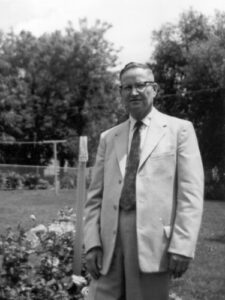Paul H. McGehee - Holiness Heroes

Paul H. McGehee
Paul H. McGehee was born November 4, 1898, in Nevada, Missouri. He was the eighth child in a family that, beside the parents, included thirteen children. As a young lad, he attended grammar school at the Bethel and Fern rural schools in Vernon County, Missouri, and, later, the High School in Nevada, Missouri.
Sometime after graduation from high school, he took work at Draughton’s Business College in Springfield, Missouri.
At the age of fourteen, he was converted one evening in the year 1914, while kneeling alone in a persimmon grove across the road from the Bethel schoolhouse. He obtained the experience of entire sanctification some months later in the camp-meeting at the Bridalveil Park in Fort Scott, Kansas. For several weeks prior, he had yearned for the experience of perfect love. On a weekend he drove the thirty miles from Nevada to Fort Scott in an old buggy pulled by a blind horse, with the intent to seek and obtain the experience for which he craved. On the day following the evening of blessing, he drove the buggy on the return home, stopping occasionally to wrap the buggy tires with baling wire to keep them from coming off. He later said that, soon after leaving the camp-meeting that morning, he heard the strains of an exquisite heavenly music.
On July 11, 1926, Paul assumed a position at The Herald and Banner Press, which was then situated at Fort Scott, Kansas. He took the position at the suggestion of a friend. In a 1985 feature in The Johnson County Star, a subsidiary of The Kansas City Star, he says that there was more involved in his decision than the merely fortuitous: “I believe that if you live for the Lord He will direct your ways.” Ray L. Kimbrough was then the editor of the Church Herald and Holiness Banner” and the administrator of the Press. He informed Paul that, if he were offered the position, he would be expected to remain with the Press for a long period of time. It may be that Kimbrough did not fully realize the significance of the demand; for Paul took Kimbrough at his word and remained with the establishment for more than sixty one years! In a culture marked by indecision and insecurity, by the inability of many to forge a unified destiny, this achievement of Paul’s is without question an example par excellence. It is a testimony to the singleness of purpose, to that which the Danish philosopher/theologican Soren Kierkegaard has called: “purity of heart is to will one thing.”
Paul’s salary was $25.00 a week. The tools he used are now obsolete. In The Johnson County Star there is a picture (Note: link opens 57k picture) of Paul standing by some of those tools: a metal label and an open hand feed press. The first press he operated was a Model X Intertype, which, he said, “looked like a mountain.” During his relationship with the Press, he served in various capacities: Office Editor, Managing Editor of the Church Herald, and Editorial Assistant.
Miss Maybelle Harris of Cuba, Alabama, had come to Fort Scott with the Kimbroughs to care for their children and to work in the Banner office. The circumstances of Paul’s and Maybelle’s taking more than a causal notice of each other are quite out of the ordinary. Shortly after he went to work for the Press, he had an accident in which his arm became entangled in some machinery and was broken. Maybelle hurried to his aid, and in comforting him ran her hands through his hair, inadvertenly covering his head with ink. As he puts it in his interview with The Johnson County Star: “It was at that moment I decided she would make a good wife.” They were married on February 3, 1929.
When one reads the tributes to Paul in the October 22, 1987, memorial issue of The Church Herald and Holiness Banner, one is impressed with the uniformity of the testimony to Paul’s sense of responsibility to do excellent work in the printed page, his interest in and concern for the welfare of others, his love of nature particularly in the form of gardening and care of roses, his ethical sensitivity, and, finally, his absolute and total commitment to the Will of God. He was, indeed, a superb Christian gentleman.
I met Paul McGehee in the fall of 1939, a short time after I had left my home in Oregon to enroll as a student at KCCBS. E. W. Roy had occasion to drive one Sunday morning to Fort Scott. He asked me to accompany him. It was a beautiful, clear morning. The leaves were taking on their splendid fall color. When we arrived in Fort Scott, Bro. Roy introduced me to Paul. I remember the occasion as if it were yesterday. I saw a rather small man, neatly, but not ostentatiously, dressed. He looked at me with a certain directness of gaze. It was in no sense one of dismissal or harshness. Rather, I sensed in that look an outpouring of friendship and of affection for the young lad who then was trying to cope with the new world into which he had entered. I knew that I had found a friend who would always be true and helpful. Beyond the perceptions of sense and reason, there is, or there is possible, a sensing of the inwardness of others, an emotional appreciation of the values that constitute the person. That is what I saw on that Sunday morning.
Toward the close of my Junior year, the spring of 1942, I became the pastor of the Diamond church, a few miles south and east of Fort Scott. I usually hitchhiked to Fort Scott on Saturdays. After the Sunday evening service, Bro. Dick Query, at whose home I stayed over the weekend, would take me to Fort Scott and drop me off at the northern outskirts of the town, on highway 69. Usually, I was able to catch a ride to Overland Park and be there for my Monday morning classes. But there were times when I could not get a ride. Paul and Maybelle had given me a standing invitation to spend the nights at their home when I needed to do so. They would always wait up Sunday evenings until they knew that I had gotten a ride to Overland Park and would not be knocking at their door for lodgement and a good Monday morning breakfast.
Over the next few years, our friendship grew. Paul was very much interested in the Young People’s movement in The Church of God (Holiness). He worked constantly, and with some criticism, for its establishment. I was given the task of writing weekly lessons for the Sunday evening meetings of the various societies in the Church. It was here that I began to learn to write. Paul always went over the material with me and made corrections and suggestions. I learned from him a precision of writing and expression.
These were the days of the Second World War. Paul was the General Secretary of the Servicemen’s Ministry of The Church of God (Holiness). He wrote weekly letters to those who were in the Armed Forces. The governmental bureaucracy decided that he was not doing his part in aiding the war effort. So he was required to take a job on a farm near Fort Scott. This meant that he had three full-time jobs: his work at the Press, his work with the Servicemen’s Ministry, and his work at the farm. I recall many times seeing him at the end of the day, exhausted from the day’s labor, and having yet many hours of work remaining in order to fulfil his other responsibilities. But he never complained. The Writer of Hebrews, in speaking of those who preserved in their faith, describes them as “Of whom the world was not worthy.” Surely, Paul is one of them.
Maybelle McGehee died on March 5, 1980. While Paul missed her greatly, he did not give up. He learned to cook, do the laundry, and take care of the home. In a letter that he wrote to me in 1985, he said: “I am beginning on my 2-weeks’ vacation for this year, and though I appreciate it, a vacation, without my dear Maybelle, is insipid, for I do not care any more to go on a long trip away from home. . . . These certainly are fast-changing times, as you are aware. Thank God, for His salvation and Word which is unchangeable, for it “is forever settled in heaven.’ I live a lonely life, to be sure, but I am striving daily to fill it with things and Christian acts that will bless others. I am physically well, barring a few little ills such as are common to us all. I am still able to take care of myself and my home, with lawn and garden work, besides still editing the Church Herald and Holiness Banner 4½ days a week, besides helping to mail it out, wrap it, and all else that goes with it. I am thankful for something to do to occupy my heart and mind, so long as I am physically and mentally able to do it. I have many friends and wonderful neighbors, and my garden is a joy to me, for I share its fruitage with neighbors and friends and church and office folk who have none. During my vacation, I will clean house and perform smaller tasks that annually need attention, and by the time the two weeks roll by, I will be ready to assume again my loved work at the office, trusting the dear Lord to bless it, to His glory. . . . I have always loved you dear ones, and that tie of Christian love still encircles and comforts me in my lonely hours. The precious Holy Spirit, our Comforter, is with me moment by moment, and I rejoice in my Savior and His provision for my salvation. My spiritual sky is clear, and though trials and clouds of loneliness do come, I am, by God’s grace, ‘running up the shining way’ of holiness.”
A year later, a few months before his death, he again wrote: “God bless you, and keep you true to Him. One day the battles of this life will be over, but as the song says, ‘Until then my heart will go on singing,’ even in the midst of tears at times, because of my sweet Maybelle’s absence from the home.”
Near the end, with but few members of the family of his childhood remaining, he wrote: “It looks almost that I might become ‘The Last Leaf.’”
“And if I should live to be
The Last leaf upon the tree
in the spring,
Let them smile, as I do now,
At the old forsaken bough
Where I cling.”
–Oliver Wendell Holmes.
Silas McGehee, Paul’s nephew, wrote in the Memorial Issue: “When he was nearing his end, so near that he could hardly speak, he was concerned because he could not care for himself. On several occasions about a week before his death he said, ‘I have always been able to help others, and now I can’t help myself.’ He was troubled because he could not still help others.”
Paul H. McGehee, beloved saint of God, died at the Shawnee Mission Medical Center of Overland Park, Kansas, on September 9, 1987. He had taken his final step, on this the near side of the boundary, on “the shining way.”
— J. Prescott Johnson

Church of God (Holiness)
The mission of the Church of God (Holiness) is to exalt Christ, equip the Church, and evangelize the world.